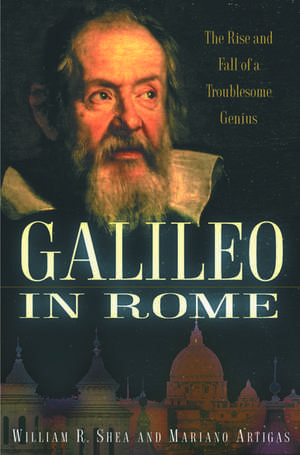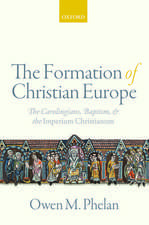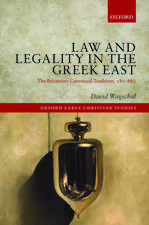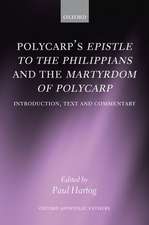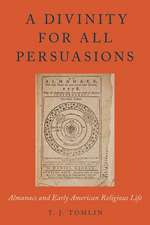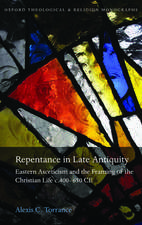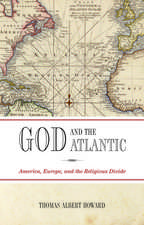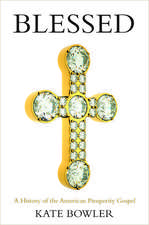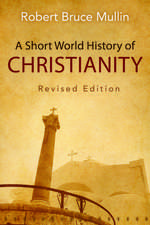Galileo in Rome: The Rise and Fall of a Troublesome Genius
Autor William R. Shea, Mariano Artigasen Limba Engleză Paperback – 21 oct 2004
Preț: 123.17 lei
Nou
Puncte Express: 185
Preț estimativ în valută:
23.58€ • 24.25$ • 19.56£
23.58€ • 24.25$ • 19.56£
Carte tipărită la comandă
Livrare economică 08-14 februarie
Preluare comenzi: 021 569.72.76
Specificații
ISBN-13: 9780195177589
ISBN-10: 0195177584
Pagini: 272
Ilustrații: 41 halftones
Dimensiuni: 155 x 234 x 20 mm
Greutate: 0.44 kg
Editura: Oxford University Press
Colecția OUP USA
Locul publicării:New York, United States
ISBN-10: 0195177584
Pagini: 272
Ilustrații: 41 halftones
Dimensiuni: 155 x 234 x 20 mm
Greutate: 0.44 kg
Editura: Oxford University Press
Colecția OUP USA
Locul publicării:New York, United States
Recenzii
Galileo in Rome represents the finest in modern Galileo scholarship.
In their very readable, clear, and concise accounting of Galileo's life and trial, the authors concentrate on the six visits that Galileo made to Rome, exploring what happened during those visits, the theological and political reasons behind them, and their ramifications.... Most accessible...highly recommended for academic and public library collections.
Drawing on a wealth of letters and archives, the authors construct a nuanced portrait of the complex web of political and religious institutional forces that constituted 17th-century Rome, showing that the trial of Galileo was as much the product of tension between the pope and the grand duke of Tuscany (Galileo's patron) and of Galileo's arrogance when dealing with Jesuit astronomers as it was a result of the oppressive Inquisition.
In recounting the actual people with whom Galileo fenced, as well as the theological doctrines involved, the authors demythologize the man. Their criticism makes Galileo as interesting a figure as ever.
A brilliant book about Galileo's six epochal trips to Rome. It will remain the most accessible and authoritative account of his relations with the Church in the years of his greatest discoveries.
Lucid and elegantly balanced, this story of Galileo's trials edges the Church into a fairer light.
This is a lively and persuasive re-telling of the story of Galileo's life and career. It is in the details that issues of interpretation constantly arise, but the authors have navigated the subject's minefields in convincing fashion. A readable and authoritative piece of work.
Organizing the story around Galileo's six trips to Rome, as the authors do, works very well. Their use of Galileo's correspondence gives the narrative helpful continuity. The book has a freshness that is hard to achieve in a terrain so well travelled.
Shea and Artigas have written a work exceptional for its rigor and clarity.
In their very readable, clear, and concise accounting of Galileo's life and trial, the authors concentrate on the six visits that Galileo made to Rome, exploring what happened during those visits, the theological and political reasons behind them, and their ramifications.... Most accessible...highly recommended for academic and public library collections.
Drawing on a wealth of letters and archives, the authors construct a nuanced portrait of the complex web of political and religious institutional forces that constituted 17th-century Rome, showing that the trial of Galileo was as much the product of tension between the pope and the grand duke of Tuscany (Galileo's patron) and of Galileo's arrogance when dealing with Jesuit astronomers as it was a result of the oppressive Inquisition.
In recounting the actual people with whom Galileo fenced, as well as the theological doctrines involved, the authors demythologize the man. Their criticism makes Galileo as interesting a figure as ever.
A brilliant book about Galileo's six epochal trips to Rome. It will remain the most accessible and authoritative account of his relations with the Church in the years of his greatest discoveries.
Lucid and elegantly balanced, this story of Galileo's trials edges the Church into a fairer light.
This is a lively and persuasive re-telling of the story of Galileo's life and career. It is in the details that issues of interpretation constantly arise, but the authors have navigated the subject's minefields in convincing fashion. A readable and authoritative piece of work.
Organizing the story around Galileo's six trips to Rome, as the authors do, works very well. Their use of Galileo's correspondence gives the narrative helpful continuity. The book has a freshness that is hard to achieve in a terrain so well travelled.
Shea and Artigas have written a work exceptional for its rigor and clarity.
Notă biografică
William R. Shea holds the "Galileo Chair" of the History of Science at the University of Padua, in Italy. He is Past President of both the International Union of the History and Philosophy of Science and the International Academy of the History of Science, and is currently Chairman of the Standing Committee for the Humanities of the European Science Foundation in Strasbourg. He is the author, co-author, or editor of 25 books, including Galileo's Intellectual Revolution and The Magic of Numbers and Motion: The Scientific Career of Rene Descartes. Mariano Artigas is Professor of Philosophy of Science and was Dean of the Ecclesiastical Faculty of Philosophy at the University of Navarra, in Pamplona, Spain. He holds a Ph.D. both in physics and philosophy, is an ordained Catholic priest, and has written 14 books, including The Mind of the Universe, which won a Templeton Award.
